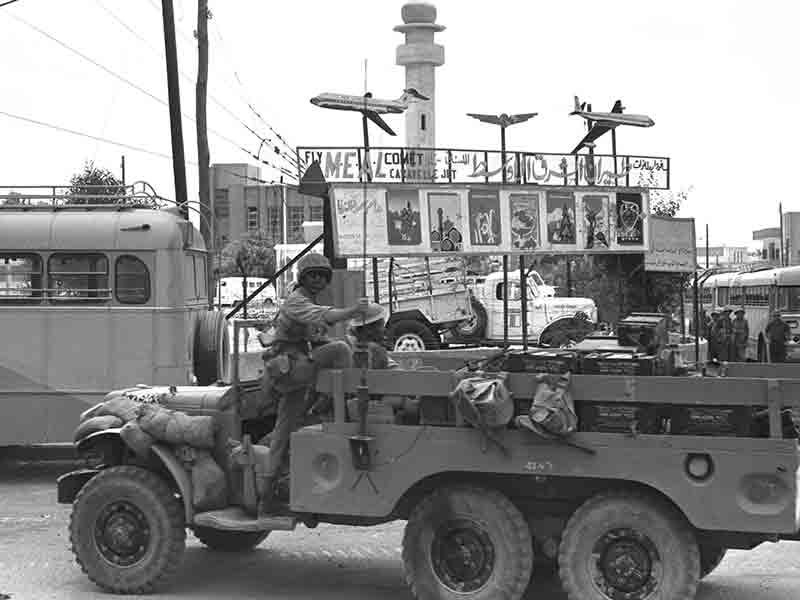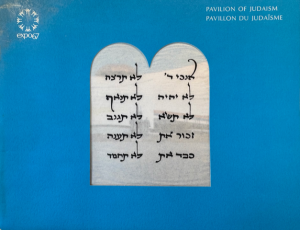Throughout the 1960s, Jews in Canada kept a watchful eye on events in the Middle East. Wars in 1948 and 1956 had left Israel intact, but still vulnerable, as it was surrounded on the north, south and west by enemies intent on destroying it. And with Arab states such as Egypt and Syria continually denouncing Israel with promises to “wipe” it “off the map,” as Iraqi President Abdur Rahman Aref later put it, another violent conflict was always a possibility.
In 1967, no one wanted another war, least of all the Americans, Israel’s ally. U.S. President Lyndon B. Johnson, who, in the midst of the Cold War and mired in a stalemate in Vietnam, feared that another Arab-Israeli war might trigger a terrible confrontation between the United States and the Soviet Union, which backed the Arabs. Thus, in mid-May, LBJ desperately sought a diplomatic solution after Egyptian President Gamal Nasser mobilized his forces, ordered United Nation Emergency Forces out of the Sinai, where peacekeepers had been stationed since 1956, and essentially closed the Straits of Tiran to Israeli shipping. Israeli Prime Minister Levi Eshkol did not want another conflict, either. Yet tensions began to increase and the prospect of negotiating a peaceful resolution became remote.
Even Canadian Prime Minister Lester B. Pearson, the Nobel Peace Prize-winning originator of the UN peacekeeping force who had an ardent faith in the power of diplomacy, conceded that Israel was in an impossible situation. On May 31, he stated in a television interview that while he had “no feeling of any kind in favour of one side or the other,” he understood “the basic assumption that if a state, a sovereign state, is told by its neighbour, ‘We are dedicated to your destruction,’ that has to be changed.” Five days later, early in the morning of June 5, Israel took matters into its own hands with a devastating attack on Egypt’s military, which initiated the Six Day War.
Despite having utter confidence in the prowess of the Israeli army, the threats made by Nasser and other Arab leaders during the last part of May had made Jews in Canada nervous. They truly believed that another Holocaust was imminent. “The crisis had triggered something in Jewish minds and hearts,” Rabbi Gunther Plaut of Toronto’s Holy Blossom Temple wrote a few days after a ceasefire had been agreed to on June 10.
“Jews did not know what would happen (on June 5); they only knew their fears and their anxieties and their total involvement. I saw many tough men cry on that day.”
Similarly, Rabbi Wilfred Solomon of Vancouver’s Beth Israel synagogue recalled in a 2001 interview with historian Harold Troper that it was “as if we were being held by the throat.… It was as if someone was about to throw the last Torah in the fire.” Even Jews who did not necessarily consider themselves Zionists were caught up in the national Jewish anxiety. At a rally in Winnipeg in late May held at the Rosh Pina Synagogue, more than 1,000 people turned out in “support of Canada’s peacekeeping efforts and as a demonstration of solidarity with Israel,” as a Canadian Jewish Congress (CJC) news release stated.
Organized marches through the streets of Canadian cities championing Israel were still some years away. As were the usual flurry of newspaper opinion articles – for and against Israel’s actions – followed by the predictable barrage of letters to the editor in response. (About the most controversial issue occurred in Toronto, when, in the midst of the war, several rabbis publicly accused the larger Christian community of failing to support Israel, a charge that did not quite hold up.) But in June 1967, Canadian Jewish support manifested itself in several ways.
Even before the fighting started, young and idealistic Jewish men and women traveled to Israel to volunteer in any way they could, despite the trepidation of their parents and families. On May 30, at the Vancouver airport, surrounded by 50 family and friends, four young Jewish adults between the ages of 20 and 24 left for New York, where they met up with hundreds of other volunteers and proceeded to Israel on an El Al flight. Their expenses had been paid for by the Vancouver Jewish community. As they said their goodbyes, the large crowd spontaneously burst into a chant of “Am Yisrael Chai” – “the nation of Israel lives.” This same scene was played out countless times at Canadian airports over the next few weeks.
In Toronto, 21-year-old Cheryl Zimmerman, who was in her second year at the University of Toronto, prepared for her trip, hoping that she could help care for Israeli children. She was one of more than 340 Jewish students in the city who offered their services. In Ottawa, 12 Jewish men and women had already left for Israel by June 5. And in Saskatoon, more than 15 young men and women were making their travel plans. Most of the volunteers wound up driving trucks, delivering goods and guarding kibbutzim, with only minimum training on the proper use of a weapon. The war ended quickly and the vast majority soon returned to Canada.
Jews in Canada did not rush to make aliyah. As historian Michael Brown has shown, in a comparison of aliyah rates from the ’50s to the early ’80s between Canada, the United States, the United Kingdom, France, Australia, New Zealand, Argentina and South Africa, and accounting for population differences, Canada consistently ranked near the bottom. But they did open up their pocket books, as they had always done, and they did so on an unprecedented scale. The risk that Israel might be destroyed prompted an avalanche of financial donations that surprised even the most veteran community fundraisers.
The Bronfman family, the wealthiest Jewish family in the country, usually contributed $2 million to Jewish charities; in 1967, the Bronfmans gave $6 million to Israel (the equivalent of about $43 million in 2017). “Mr. Sam” made the Israeli cause his own. On June 4, Bronfman held a mini-summit of high-rollers at Montreal’s Montefiore Club. As the story goes, one of the men in attendance handed him a cheque for $250,000. He scanned it and tore it up. “Get serious,” he said. He wanted more and got it. By the time the meeting was done, he had $13 million in hand. For the larger Canadian community, Bronfman and other CJC and Zionist leaders at first set their target goal at $10 million. National delegates at a special meeting in Montreal on June 4 insisted that they could raise more than double that –and they did, reaching $25.4 million, a remarkable amount of money for a community of less than 300,000 people and more than triple what had been raised in 1956.
It was a “step-up-to-the-plate” moment for Jews from Halifax to Vancouver. On June 5 in Toronto, 200 fundraisers convened in a room at the Park Plaza Hotel and in 90 minutes, collected $2.1 million in donations. The head of Toronto’s Emergency Committee for Israel’s Survival was the city’s former mayor, Phil Givens. In what was billed as an “extraordinary emergency,” Vancouver’s United Israel Appeal raised $300,000 from the approximately 8,000 Jews in the city. Further east in Regina, a city with a Jewish population of only 750, the community brought in $40,000. Likewise, the community in Hamilton, Ont., which had around 4,000 members, contributed $180,000 to the United Jewish Appeal, and Winnipeg’s larger Jewish population topped $1 million for the first time. Even Jews who had not had much to do with synagogues or other community institutions dug deep – all to save Israel.
Bronfman and top CJC officials travelled to Ottawa in an attempt to influence Pearson’s Liberal government to back Israel at the United Nations. Though the prime minister and his secretary of external affairs, Mitchell Sharp, promised the group that they would indeed support Israel, this commitment, like Liberal government commitments of the past, was not absolute.
The opposition Conservatives under John Diefenbaker were less indecisive when it came to Israel’s survival. Diefenbaker, who was to lose the party leadership to Robert Stanfield in early September 1967, did not mince his words about Israel. “There can be no neutrality by Canada with regard to those who have the specific objective and purpose of destroying the Hebrew race,” he declared in the House of Commons on June 8.
While most Jews cheered these words, a majority of Canadians tended to view the Middle East conflict the same as the Liberals – according to polls conducted by the Canadian Institute of Public Opinion in the late ’60s and the early ’70s, their sympathies were with neither side.
On June 7, Israel’s miraculous recapturing of Jerusalem from Jordanian control close to 1,900 years after the Romans had expelled the Jews from the Old City, was a moment no Canadian Jew would ever forget. The pictures and scenes televised around the world of Israeli soldiers praying by the Western Wall of the ancient Temple gave a tremendous sense of relief and pride to Jews in Canada and around the globe. There were special synagogue services and, though it was not Rosh Hashanah or the end of Yom Kippur, the shofar was blown. But this was not a normal event. “I have never seen anything like it at any synagogue anywhere,” commented Rabbi Stuart Rosenberg of Toronto’s Conservative Beth Tzedec synagogue on June 9. “The reaction was visceral – there seemed to be an awareness that this had been the most historic week in modern Jewish history.”
Israel’s victory in 1967 more than tripled the size of the territory it controlled. Yet with the Arab leaders initially refusing to sign peace treaties in exchange for the return of conquered land, a whole new set of intractable problems were to take hold of the region for the next 50 years and counting. As a Globe and Mail editorial accurately pointed out on June 7: “The irony of Israel’s courage and success in the Middle East conflict … is that military victory does not produce peace.” And it hasn’t yet.
Historian and writer Allan Levine’s next book, Seeking the Fabled City: The Canadian Jewish Experience, will be published in 2018.







